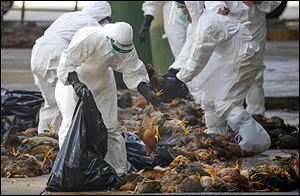
Bird flu redirects trade of U.S. goods
Millions of chickens killed globally
4/18/2017CHICAGO — Global outbreaks of bird flu in poultry have altered the flow of U.S. chicken meat, eggs, and grain around the world, adding to challenges faced by domestic exporters and giving a leg up to Brazil, which has so far escaped the disease.

Health workers collect dead chickens killed after bird flu was found in some birds at a market in Hong Kong.
Different strains of avian flu have been detected across Asia, Europe, Africa, and in the United States in recent months, leading to the killing of millions of birds and a flurry of import restrictions on eggs and chicken meat.
U.S. grain traders such as Bunge Ltd. and Cargill Inc. have lost business because poultry deaths have reduced feed demand. Some domestic poultry producers, though, have managed to boost sales by taking advantage of trading bans that hurt rivals.
Sanderson Farms Inc,, the third-largest U.S. poultry producer, said it sold more chicken to Iraq when Baghdad backed away from Europe’s poultry because of bird flu, or avian influenza, in the bloc.
Iraq imported 185.6 million pounds of U.S. chicken meat last year, about 3 percent of total U.S. chicken meat exports.
Data on chicken exports are not yet available for March, when the United States confirmed its first case of a highly lethal form of bird flu in commercial poultry in more than a year.
After the finding, South Korea, suffering its own worst-ever outbreak of bird flu, blocked U.S. poultry and eggs. That shut off opportunities for U.S. exporters hoping to make sales to cover shortfalls in South Korea, said Keithly Jones, a senior economist for the U.S. Department of Agriculture.
Last month, the USDA cut its forecast for 2017 U.S. egg exports by 6 percent to 305 million dozen because of South Korea’s ban.
U.S. grain traders, who were grappling with a global supply glut before flocks in other countries were killed to contain bird flu, have faced lower demand for the corn and soybeans that provide feed for chickens.
Bunge, one of the world’s top grain and oilseed traders, told Reuters that shipments to South Korea for February and March declined “on the back of reduced feed productions.” Shipments have since been picking up, according to the company.
In March, Cargill said South Korea’s outbreak, in which about 35 million birds have been killed, contributed to a decrease in quarterly earnings in its global animal nutrition unit.
The United States has reported only two cases of highly lethal bird flu in poultry so far this year and a handful of less-dangerous cases. U.S. officials have said the risk of the disease spreading to people is low.
Many trading partners have responded by blocking poultry from U.S. counties or states with infected flocks, rather than from the entire country.